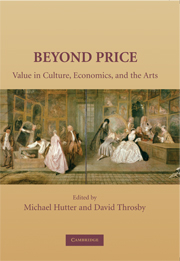Book contents
- Frontmatter
- Contents
- List of Contributors
- Preface
- 1 Value and Valuation in Art and Culture: Introduction and Overview
- PART ONE ORIGINS OF MEANING
- PART TWO THE CREATION OF VALUE IN ARTISTIC WORK
- PART THREE CONTINUITY AND INNOVATION
- 8 Value in Yolngu Ceremonial Song Performance: Continuity and Change
- 9 The Ritual and the Promise: Why People Value Social Ritual
- 10 “More than Luther of These Modern Days”: The Construction of Emerson's Reputation in American Culture, 1882–1903
- PART FOUR APPRECIATION AND RANKING
- PART FIVE CULTURAL POLICIES
- Index
- Plate section
- Plate section
- References
10 - “More than Luther of These Modern Days”: The Construction of Emerson's Reputation in American Culture, 1882–1903
from PART THREE - CONTINUITY AND INNOVATION
- Frontmatter
- Contents
- List of Contributors
- Preface
- 1 Value and Valuation in Art and Culture: Introduction and Overview
- PART ONE ORIGINS OF MEANING
- PART TWO THE CREATION OF VALUE IN ARTISTIC WORK
- PART THREE CONTINUITY AND INNOVATION
- 8 Value in Yolngu Ceremonial Song Performance: Continuity and Change
- 9 The Ritual and the Promise: Why People Value Social Ritual
- 10 “More than Luther of These Modern Days”: The Construction of Emerson's Reputation in American Culture, 1882–1903
- PART FOUR APPRECIATION AND RANKING
- PART FIVE CULTURAL POLICIES
- Index
- Plate section
- Plate section
- References
Summary
Introduction
Contemporary historians are routinely asked to explain how certain ideas, individuals, and practices happen to gain great cultural value. They often respond by employing the concept of “social construction.” In explaining why Ralph Waldo Emerson (1803–1882) has been such a highly revered figure in American culture, this chapter traces the outlines of a story that not only has taken place in time, but has also entailed construction in the literal sense – an actual assembly of various parts of the story in particular stages, as well as a temporal process in which later stages were built upon, and out of, earlier stages.
All construction stories are guided by the concept that value is never just a matter of natural ability or talent. Yet, as Ian Hacking (1999) has pointed out, this apparently simple concept allows for various grades of commitment. The most controversial argues that we should abandon the notion of evaluation as a neutral account of objective qualities and accept in its place one that sees evaluation as invariably contingent on personal interests and needs. Less contentious is a historical grade of constructionism wherein intellectual historians (among whom I number myself) employ the concept of social construction as a heuristic device. They view enduring reputations more as empirical phenomena than as objects of suspicion. And the stories they tell about enduring reputations typically include careful reconstructions of a dynamic process made up of distinct stages, as well as discussions of what objective factors over time would justify the reasons for endurance.
- Type
- Chapter
- Information
- Beyond PriceValue in Culture, Economics, and the Arts, pp. 159 - 176Publisher: Cambridge University PressPrint publication year: 2007



